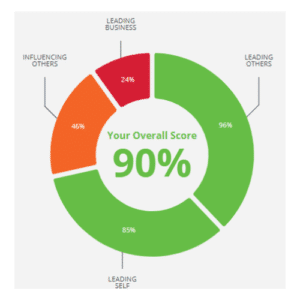Need for Control: how can this human need manifest in leadership?

The Need For Control and How This Manifests in Executives (Part 2 in the Human Needs Series)
In the first blog post of this series, which you can view here, you will recall that we talked about a personality psychology and trait and behavioural theory models that suggests four needs that humans need to meet. These are significance, control, belonging and contentment.
As humans, we should be striving to fulfil all four of these needs. With that being said, not everybody will give the same level of priority to each need. Rather, the priority that we give to each need will vary from person to person, depending on our traits, beliefs, values, experiences, and way in which we see the world as an individual.
As we mentioned, business leaders, executives, and CEOs are more likely to prioritise significance and control over the other two needs. In this blog post, we are going to be focusing on control. This may be described as our need for security, stability, and structure.
This need for control may relate to how safe and secure we perceive ourselves to be in our role and in our position as a leader. It may also concern things like having a stable income and employment, and feeling like we have a high degree of control over our professional and personal life. It could also relate to external elements within business that are outside of our control but keep us up at night, as well as how much we worry.
Someone whose security needs have been met will feel comfortable and secure with their personal and professional circumstances. Sometimes though, these security needs may not be met. For example, you might find it challenging to manage a difficult Board or expectations from multiple key stakeholders. Or, you might feel unsure about your future in your role, or some other aspect of your work. All of these situations can invite a poor sense of security.
This need for control is likely to manifest as fear of failure, overthinking, worry, self-doubt, and seeking validation – all of which are behaviours that may be experienced by people with this need. Someone with a need for control may also be preoccupied with getting others to admire and respect them, be stuck in a perpetual cycle of overthinking and worrying, obsessed with perfectionism, take things personally, and really beat themselves up about their mistakes.
All of these things are mechanisms by which we may attempt to take control, and fulfil this need. They can also help us to prevent pain and find comfort.
Sometimes, the manifestations of this need for control will disappear as the situation that is causing your feelings of insecurity or lack of control blows over. For example, your business might pull forward out of a rough patch, and things will return to normal performance-wise. Or, you might be offered a new, highly-paid job that will resolve your financial worries.
However, it is important to recognise that insecurity can be a fluctuating issue within our personal and professional lives, which continues to crop up because it becomes a behavioural pattern. Life can be dynamic and unpredictable, so change, uncertainty, and the resulting lack of control is something that we need to come to expect and accept. Because of this, it is important that we understand how to manage it, and are equipped with the know-how and strategies to do so.
There are a few different strategies that can help you to do this. These include:
- Master your mindset to accept the inevitability of life’s unpredictable nature, and embrace this as something that is outside of your control
- Know that your thoughts are not reality
- Using positive self-talk to reinforce your new mindset
- Re-assessing your priorities and being honest with yourself as you make a plan about what you will do to create a more secure situation
- Practicing mindfulness and meditation techniques, which will help you to ground yourself, focus, and gain clarity in times of poor security
- Talking to a friend, relative, or co-worker about how you’re feeling
- Seeking professional help from a psychologist or counsellor who specialises in stress management, as they will be able to help you to acquire strategies to relinquish control and accept the unpredictable
- Talking to another manager, executive, or business leader outside of your company or organisation, who has walked the path before you and can a mentor and supporter in times of instability
As a business owner, manager, CEO, or executive, it is important that you prioritise the fulfilment of this need for control (remembering that equal priority needs to be given to the other three needs as well!) This will support you in performing at your best, and being the best version of yourself as you lead your organisation from the front.
If you’re unsure where to get started with fulfilling your need for control, you may benefit from coaching or mentoring from a professional business coach and executive advisor. This is one of the services I offer, which you can find out more about here.
If you’ve found this article helpful, you may be interested in the rest of our series on human needs and how these relate to executives. You can find our next post in this series here.
Resources:
https://www.thoughtco.com/maslows-hierarchy-of-needs-4582571
https://www.simplypsychology.org/maslow.html
https://study.com/academy/lesson/growth-need-definition-lesson-quiz.html
https://psychcentral.com/blog/when-you-crave-control-of-everything#1
HOW WELL DO YOU LEAD YOURSELF, LEAD OTHERS AND LEAD IN BUSINESS?
DISCOVER YOUR LEADERSHIP SCORE - TAKE THE TEST - CLICK HERE
P.S. Whenever you’re ready… here are 4 ways I can help you intensify your impact, influence and income.
1. Grab a Copy of my Latest Book (available in all good bookstores, and on Audible)
Lead Beyond 2030 shares the nine skills you need to intensify your leadership impact. A powerful exploration of what separates great leaders from the rest. - Find Out More
2. FREE - Test Your Leadership Scorecard:
Discover your leadership score and the 9 leadership accelerators to increase your ability to intensify your impact and performance. — Click Here
3. Join our Master Influence Program and be a Case Study
If you're ambitious, this is for you - I’m putting together a new leadership case study group… stay in touch for details. If you’d like to work with me to master the art of influence and unleash your most powerful self…Click Here
The ability to influence is the greatest accelerator of impact and performance, and it intensely affects our career, our income and how we lead people. — Find Out More
4. Work with me privately
If you’d like to work with me privately to take your career, impact and leadership to the next level… send me a message and with the word “Privately”… tell me about yourself and what you'd like to focus on together and achieve, and I’ll get you all the details! — Click Here
Caroline Kennedy, author of Lead Beyond 2030: The Nine Skills You Need to Intensify Your Leadership Impact, is an accomplished, award-winning CEO and global thought leader on business and leadership. She is a highly sought-after mentor and coach to top global executives. A respected keynote speaker and author, Caroline’s methods are neuroscience-based to achieve rapid development and growth.

